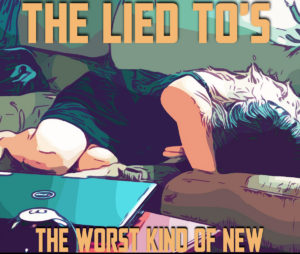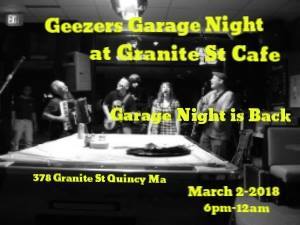 The Lied To’s latest album The Worst Kind Of New finds the partnership of Doug Kwartler and Susan Levine sharing the thoughts and feelings they’ve experienced since losing older family members to the passage of life. With a good amount of lyrical detail and graceful expression, The Lied To’s a painterly description of what they have been dealing with.
The Lied To’s latest album The Worst Kind Of New finds the partnership of Doug Kwartler and Susan Levine sharing the thoughts and feelings they’ve experienced since losing older family members to the passage of life. With a good amount of lyrical detail and graceful expression, The Lied To’s a painterly description of what they have been dealing with.
Opening track “Midnight Kiss” finds Levine mourning a loved one with a considerate vocal pace. She emits only as much voice as the listener’s heart can feel at once. Her uncanny feel for the emotive grist of her song also manifests itself in her timbre, edgy but loaded with feeling, pressing out the details of her loss and her sentimental take on them. Dark, moody cello and light rain drops of electric piano complete the picture while leaving the emotion hanging in the air, beautifully unresolved.
While both Kwartler and Levine sing lead and harmony vocals and play rhythm guitar, Kwartler plays all other instruments, and a truckload of different instruments it is.
With a speedy shuffle beat and an acoustic guitar backbone, “It’s Not Who You Love” lets Kwartler swing his vocal over a wide gaping space, an expansive expression that envelops all. A whistling melody from a pedal steel keeps a pretty, weepy melody floating just in the backdrop of the main scene of wide action vocals and acoustic instrumentation. It’s the juxtaposition of these foreground and background sounds that give this a terrific three dimensional quality.
Mellow electric guitar phrasing and a low boil organ cushion Levine’s sweet vocal rise on “Winter Of The Winter.” While that pretty lead guitar moves around Levine doubles the emotive tenderness of this piece. Playing it rock and roll style with a rhythm section keeps a fine muscular pulse. It’s hard to decide which instrument to like best, including the voice, as every note has its own shine and the parts are so well assembled.
Kwartler wraps his handsome voice around a tender mournfulness on “Long Lonesome Road.” Levine chimes in on his chorus, texturing this sparse beauty of a song that rings with emotive authenticity. Kwartler’s voice over a sparse but flinty accompaniment leaves a chilling feeling in this piece’s wide open space. Slow, perky notes inject a myriad of feeling while remaining sublime enough to make a clever contrast with the fullness of the vocals.
A lead guitar waltzes us into “Missing You,” a Levine sung number that benefits greatly by the way she merrily rides the jaunty melody line beneath her. That lead guitar takes its own walk, and conveys an ambivalence of feeling. When it plays beneath Levine’s voice and along side a perky organ and a playful acoustic guitar, we feel respectfully guided through Levine’s emotional landscape.
Kwartler’s self-restrained vocal perfectly matches the merry, jaunt motions of “Brokedown Jamboree.” He rekindles old time ballroom fun with his ability to spread his voice over a horn and accordion segment that feels straight out of one of Jay Gatsby’s evening parties.
“Time” unfurls slowly. Levine’s weepy vocal sprawls over the landscape as brittle mandolin notes s with a forlorn sadness. Levine’s vocal becomes more assertive as she moves further into the vibe, expanding strongly in the chorus, a chorus that grabs the listener’s attention like a lasso. This one grows on the listener until one is immersed in Levine’s world of familiar sorrow.
Going for a roots rock expression on “Two Days,” Kwartler and Levine sing over a full band. Kwartler conjures images of Bob Dylan, The Band, and Joni Mitchell as he moves his chirpy timbre to drums, low end, bluesy organ, and a thrusting rhythm guitar. It’s a good piece of music due to the quality of vocal expression and Kwartler’s performances on each instrument. An electric guitar gives off a lot of crunchy chords and bristling phrase. The organ fills up more space with a soulful feel that pours like gravy over the meaty and potatoes of this full bodied gem.
“Other Side Of Gone” finds Levine heartily singing about the feelings one has after a loss has occurred. Her downtrodden tone does not diminish the sweet beauty of her voice. She is a good reporter of what she is feeling. Her vocal sustains echo with heartache, expressing the depth of her loss while providing the listener an in into her emotive engine.
“Clay Pigeons,” a cover of Michael David Fuller’s folksy song of moving onto a better life, shows the chemistry between Kwartler and Levine. Their voices not only blend perfectly. They each develop the emotive content of this piece, a musical pairing that works because there is chemistry between them, a mutual sense of when to build peaks in the song before taking the listener back down into their valleys.
“Long Way Home,” too, is a cover, a Tom Waits song that this pair pares down to a pretty expression of loss and longing. Singing over a slapping, tuneful beat, she makes her way through this terrain with a subtle strength. Her voice firmly asserts just the right amount per measure, a considerate pace that moves the piece forward as much as its time keeping percussive center. Kwartler chimes in on the chorus and the texture there expands the feeling just enough to stay within this tune’s sensation of travel.
Close out track “It’s Only Love,” a Kwartler lead number, lets him inject his handsome, gritty croon tightly between firm guitars. His voice presses out a smooth rendering of all he has felt in his heart for many months. He takes his time issuing his detailed vision of a life without loved ones who are gone. It is too difficult to tell if he presses his vocal out so smoothly because of the tight space between the guitar, or, if the guitars take advantage of the space he is leaving open for them. Yet, this tune waves like a tattered flag in the wind, a reminder of things that have come and gone. Kwartler accurately conjures this vibe with his sensitive musicianship on, again, multiple instruments.
There are a couple of bonus live tracks here. They are extra treats to an album that finds Kwartler and Levine, in their The Lied To’s identity, reaching higher ground. The Lied To’s outdo themselves with this album of strong emotional fiber and subtle musical grace. The Worst Kind Of New is their best album yet. Recorded, mixed, and mastered by Doug Kwartler at his own Hollow Body Studios in Chelmsford, Massachusetts, the album finds perfect fullness and tone in each track.

